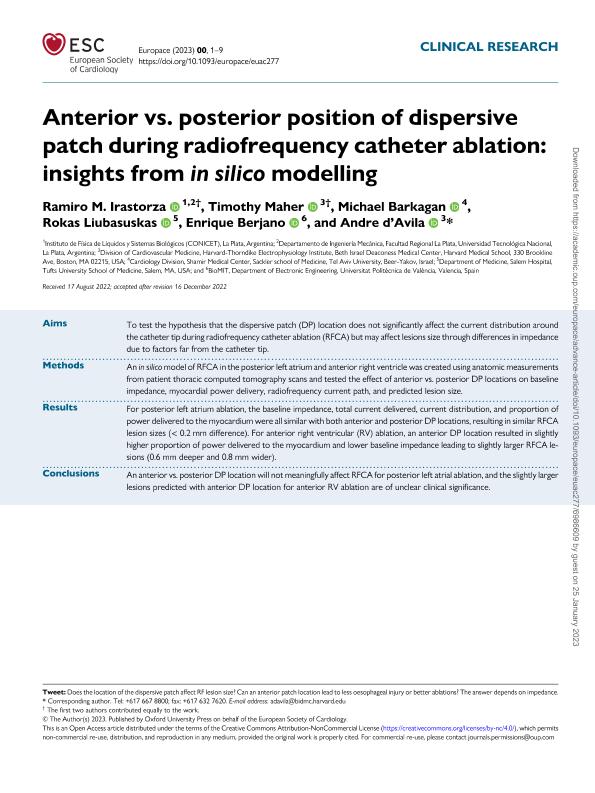Mostrar el registro sencillo del ítem
dc.contributor.author
Irastorza, Ramiro Miguel

dc.contributor.author
Maher, Timothy
dc.contributor.author
Barkagan, Michael
dc.contributor.author
Liubasuskas, Rokas
dc.contributor.author
Berjano Zanón, Enrique

dc.contributor.author
d'Avila, Andre
dc.date.available
2024-03-13T13:28:59Z
dc.date.issued
2023-02
dc.identifier.citation
Irastorza, Ramiro Miguel; Maher, Timothy; Barkagan, Michael; Liubasuskas, Rokas; Berjano Zanón, Enrique; et al.; Anterior vs. posterior position of dispersive patch during radiofrequency catheter ablation: insights from in silico modelling; Oxford University Press; Europace; 25; 3; 2-2023; 1135-1143
dc.identifier.issn
1532-2092
dc.identifier.uri
http://hdl.handle.net/11336/230387
dc.description.abstract
Aims To test the hypothesis that the dispersive patch (DP) location does not significantly affect the current distribution around the catheter tip during radiofrequency catheter ablation (RFCA) but may affect lesions size through differences in impedance due to factors far from the catheter tip. Methods An in silico model of RFCA in the posterior left atrium and anterior right ventricle was created using anatomic measurements from patient thoracic computed tomography scans and tested the effect of anterior vs. posterior DP locations on baseline impedance, myocardial power delivery, radiofrequency current path, and predicted lesion size. Results For posterior left atrium ablation, the baseline impedance, total current delivered, current distribution, and proportion of power delivered to the myocardium were all similar with both anterior and posterior DP locations, resulting in similar RFCA lesion sizes (< 0.2 mm difference). For anterior right ventricular (RV) ablation, an anterior DP location resulted in slightly higher proportion of power delivered to the myocardium and lower baseline impedance leading to slightly larger RFCA lesions (0.6 mm deeper and 0.8 mm wider). Conclusions An anterior vs. posterior DP location will not meaningfully affect RFCA for posterior left atrial ablation, and the slightly larger lesions predicted with anterior DP location for anterior RV ablation are of unclear clinical significance.
dc.format
application/pdf
dc.language.iso
eng
dc.publisher
Oxford University Press

dc.rights
info:eu-repo/semantics/openAccess
dc.rights.uri
https://creativecommons.org/licenses/by-nc-sa/2.5/ar/
dc.subject
COMPUTER MODELLING
dc.subject
DISPERSIVE PATCH
dc.subject
IN SILICO MODEL
dc.subject
RADIOFREQUENCY ABLATION
dc.subject.classification
Otras Ingeniería Eléctrica, Ingeniería Electrónica e Ingeniería de la Información

dc.subject.classification
Ingeniería Eléctrica, Ingeniería Electrónica e Ingeniería de la Información

dc.subject.classification
INGENIERÍAS Y TECNOLOGÍAS

dc.title
Anterior vs. posterior position of dispersive patch during radiofrequency catheter ablation: insights from in silico modelling
dc.type
info:eu-repo/semantics/article
dc.type
info:ar-repo/semantics/artículo
dc.type
info:eu-repo/semantics/publishedVersion
dc.date.updated
2024-03-11T12:08:48Z
dc.journal.volume
25
dc.journal.number
3
dc.journal.pagination
1135-1143
dc.journal.pais
Reino Unido

dc.journal.ciudad
Oxford
dc.description.fil
Fil: Irastorza, Ramiro Miguel. Universidad Tecnológica Nacional; Argentina. Consejo Nacional de Investigaciones Científicas y Técnicas. Centro Científico Tecnológico Conicet - La Plata. Instituto de Física de Líquidos y Sistemas Biológicos. Universidad Nacional de La Plata. Facultad de Ciencias Exactas. Instituto de Física de Líquidos y Sistemas Biológicos; Argentina
dc.description.fil
Fil: Maher, Timothy. Harvard Medical School; Estados Unidos
dc.description.fil
Fil: Barkagan, Michael. Universitat Tel Aviv; Israel
dc.description.fil
Fil: Liubasuskas, Rokas. Tufts University; Estados Unidos
dc.description.fil
Fil: Berjano Zanón, Enrique. Universidad Politécnica de Valencia; España
dc.description.fil
Fil: d'Avila, Andre. Harvard Medical School; Estados Unidos
dc.journal.title
Europace

dc.relation.alternativeid
info:eu-repo/semantics/altIdentifier/doi/https://doi.org/10.1093/europace/euac277
dc.relation.alternativeid
info:eu-repo/semantics/altIdentifier/url/https://academic.oup.com/europace/article/25/3/1135/6986609?login=false
Archivos asociados
